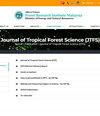EFFECTS OF TREE SPACING AND FORKING ON THE MODIFICATION OF WOOD DENSITY IN A TRIAL PLANTATION OF TACHIGALI VULGARIS FOR ENERGY IN AMAZONIA
IF 0.8
4区 农林科学
Q4 FORESTRY
引用次数: 4
Abstract
The study investigated the intra-stem and inter-stem variations of wood basic density in Tachigali vulgaris, influenced by different planting spacing and the occurrence of forking in a trial carried out in Pará State, Brazil. The experiment was performed in a randomised block design, arranged in a split-plot scheme, where plot effect was constituted by planting spacing (4.5, 6.0, 7.5, 9.0, 10.5 and 12.0 m2) and forking, as the effect of subplot (forked or not forked). The wood basic density increased from narrower to wider planting spacings. The wood basic densities in planting spacings of 9 m² (0.517 g cm-3) and 12 m² (0.529 g cm-3) were 16.9 and 19.4% higher compared to the lowest planting spacing of 4.5 m2 (< 0.500 g cm-3). Forking reduced wood density by almost 7% and promoted a wider variation within the stem. Forked stems decreased basic density towards the base-top direction. The findings suggested that, 87-months-old wood of T. vulgaris is suitable for energy purposes, and recommended for the establishment of homogeneous plantations in Brazilian Amazonia.间伐和叉伐对亚马逊地区普通大枣能量林木材密度变化的影响
在巴西帕尔州进行了一项试验,研究了不同种植间距和分岔发生对塔奇加利(Tachigali vulgaris)木材基本密度的茎内和茎间变化。试验采用随机区组设计,采用分畦方案,小区效应由种植间距(4.5、6.0、7.5、9.0、10.5和12.0 m2)和分畦(分畦或不分畦)构成。木材基本密度由较窄的种植间距向较宽的种植间距增加。9 m²(0.517 g cm-3)和12 m²(0.529 g cm-3)的木材基本密度比最低的4.5 m²(< 0.500 g cm-3)分别高出16.9%和19.4%。分岔使木材密度降低了近7%,并促进了茎内更大的变异。分叉茎沿基部至顶部方向降低了基本密度。研究结果表明,87个月龄的柽柳木材适合用于能源用途,建议在巴西亚马逊地区建立同质人工林。
本文章由计算机程序翻译,如有差异,请以英文原文为准。
求助全文
约1分钟内获得全文
求助全文
来源期刊
CiteScore
1.70
自引率
22.20%
发文量
61
审稿时长
3 months
期刊介绍:
The Journal of Tropical Forest Science (JTFS) is an international reviewed journal concerning the science, technology and development of tropical forests and forest products. The journal welcomes articles reporting original fundamental or applied research on tropical forest biology, ecology, chemistry, management, silviculture, conservation, utilization and product development. English is the official language of the journal. Only manuscripts with substantial scientific merit will be reviewed for originality, significance, relevance and quality.

 求助内容:
求助内容: 应助结果提醒方式:
应助结果提醒方式:


